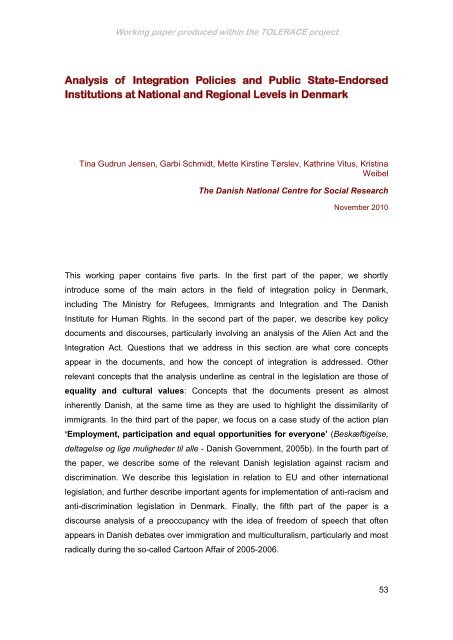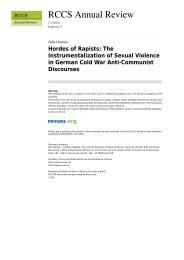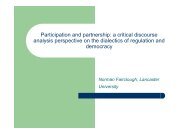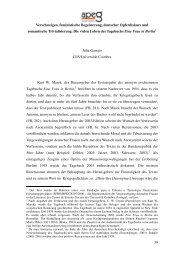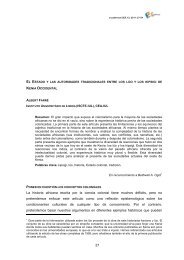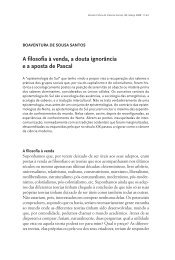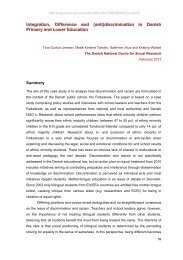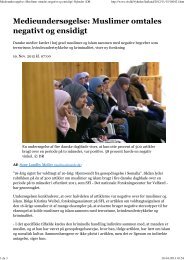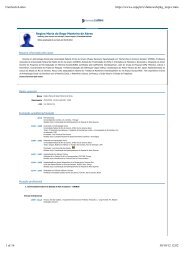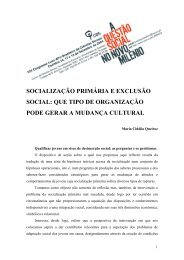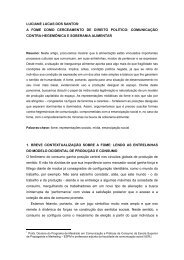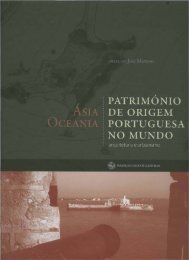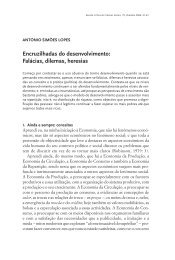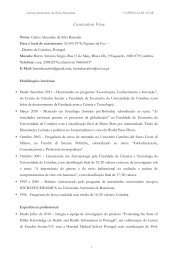Analysis of Integration Policies and Public State-Endorsed ...
Analysis of Integration Policies and Public State-Endorsed ...
Analysis of Integration Policies and Public State-Endorsed ...
Create successful ePaper yourself
Turn your PDF publications into a flip-book with our unique Google optimized e-Paper software.
Working paper produced within the TOLERACE project<br />
<strong>Analysis</strong> <strong>of</strong> <strong>Integration</strong> <strong>Policies</strong> <strong>and</strong> <strong>Public</strong> <strong>State</strong>-<strong>Endorsed</strong><br />
Institutions at National <strong>and</strong> Regional Levels in Denmark<br />
Tina Gudrun Jensen, Garbi Schmidt, Mette Kirstine Tørslev, Kathrine Vitus, Kristina<br />
Weibel<br />
The Danish National Centre for Social Research<br />
November 2010<br />
This working paper contains five parts. In the first part <strong>of</strong> the paper, we shortly<br />
introduce some <strong>of</strong> the main actors in the field <strong>of</strong> integration policy in Denmark,<br />
including The Ministry for Refugees, Immigrants <strong>and</strong> <strong>Integration</strong> <strong>and</strong> The Danish<br />
Institute for Human Rights. In the second part <strong>of</strong> the paper, we describe key policy<br />
documents <strong>and</strong> discourses, particularly involving an analysis <strong>of</strong> the Alien Act <strong>and</strong> the<br />
<strong>Integration</strong> Act. Questions that we address in this section are what core concepts<br />
appear in the documents, <strong>and</strong> how the concept <strong>of</strong> integration is addressed. Other<br />
relevant concepts that the analysis underline as central in the legislation are those <strong>of</strong><br />
equality <strong>and</strong> cultural values: Concepts that the documents present as almost<br />
inherently Danish, at the same time as they are used to highlight the dissimilarity <strong>of</strong><br />
immigrants. In the third part <strong>of</strong> the paper, we focus on a case study <strong>of</strong> the action plan<br />
‘Employment, participation <strong>and</strong> equal opportunities for everyone’ (Beskæftigelse,<br />
deltagelse og lige muligheder til alle - Danish Government, 2005b). In the fourth part <strong>of</strong><br />
the paper, we describe some <strong>of</strong> the relevant Danish legislation against racism <strong>and</strong><br />
discrimination. We describe this legislation in relation to EU <strong>and</strong> other international<br />
legislation, <strong>and</strong> further describe important agents for implementation <strong>of</strong> anti-racism <strong>and</strong><br />
anti-discrimination legislation in Denmark. Finally, the fifth part <strong>of</strong> the paper is a<br />
discourse analysis <strong>of</strong> a preoccupancy with the idea <strong>of</strong> freedom <strong>of</strong> speech that <strong>of</strong>ten<br />
appears in Danish debates over immigration <strong>and</strong> multiculturalism, particularly <strong>and</strong> most<br />
radically during the so-called Cartoon Affair <strong>of</strong> 2005-2006.<br />
53
Working paper produced within the TOLERACE project<br />
1. Description <strong>and</strong> historicity <strong>of</strong> the institutions<br />
Immigration to Denmark is not a new phenomenon. Until recently, however,<br />
immigration flows were moderate, <strong>and</strong> most immigrants came from other Nordic or<br />
Western countries. This changed in the 1960s where a growing number <strong>of</strong> immigrants<br />
mainly from Ex-Yugoslavia, Turkey <strong>and</strong> Pakistan, came to Denmark to work. In 1973,<br />
the government tried to put a stop to immigration from non-Western countries,<br />
but new immigrants have continued to arrive – primarily as a result <strong>of</strong> family<br />
reunifications <strong>and</strong> asylum. Furthermore, regional conflicts, the breakdown <strong>of</strong> empires<br />
<strong>and</strong> federations, <strong>and</strong> conflicts in the Middle East have led to the arrival <strong>of</strong> several new<br />
groups <strong>of</strong> refugees during the 1980s <strong>and</strong> 1990s (Hedet<strong>of</strong>t, 2006b). Today, immigrants<br />
<strong>of</strong> non-Western countries constitute about six per cent <strong>of</strong> the Danish population, <strong>and</strong><br />
the focus on integration <strong>and</strong> on how to manage cultural diversity in Danish society <strong>and</strong><br />
politics is greater than ever (Danish Immigration Service, 2009). Since 2001 a new<br />
immigration pattern has emerged as the number <strong>of</strong> immigrants coming to Denmark to<br />
work or study has increased significantly (including immigrants from EU/EEA<br />
countries), whereas the number <strong>of</strong> refugees <strong>and</strong> family reunifications has been reduced<br />
to almost a third <strong>of</strong> the count in 2001 (Danish Immigration Service 2010, 2004).<br />
<strong>Integration</strong> as a particular issue has been a declared objective in Danish<br />
policy since the 1980s, <strong>and</strong> in 1983 a new foreigners‘ law was introduced along with a<br />
―Memor<strong>and</strong>um on Migration policy‖. A specific integration law, however, was not<br />
formulated before 1999, being the first <strong>of</strong> its kind in a Western country. The law led to<br />
some changes in the organisation <strong>and</strong> implementation <strong>of</strong> the integration policy. The<br />
municipalities were assigned the main responsibility for carrying out the<br />
objectives <strong>of</strong> the integration policy. Previously, the task had been divided between<br />
the municipalities <strong>and</strong> the Danish Refugee Aid organization, but to improve the<br />
management <strong>and</strong> coordination <strong>of</strong> the integration process, all the separate elements<br />
were now gathered under the same political authority. For the same reason, <strong>and</strong> in<br />
order to strengthen the focus on integration issues, a new Ministry for Refugees,<br />
Immigrants <strong>and</strong> <strong>Integration</strong> was established in 2001. The Ministry took over tasks that<br />
had previously belonged to the Ministry <strong>of</strong> Interior, <strong>and</strong> was assigned responsibility for<br />
e.g. the Aliens Act <strong>and</strong> the <strong>Integration</strong> Act, statistics on foreigners, ethnic equality, <strong>and</strong><br />
instruction in Danish language <strong>and</strong> civics. With the establishment <strong>of</strong> the new ministry,<br />
most issues related to integration are now gathered under one ro<strong>of</strong> (Hedet<strong>of</strong>t, 2006b).<br />
In 1997, The Board <strong>of</strong> Ethnic Equal Treatment was established m<strong>and</strong>ated by<br />
54
Working paper produced within the TOLERACE project<br />
law to advise the parliament, the government, municipalities, private organizations <strong>and</strong><br />
other community institutions in issues related to discrimination <strong>and</strong> ethnic equality.<br />
However, along with a number <strong>of</strong> other boards <strong>and</strong> councils it was dissolved in 2002.<br />
The same year the Danish Institute for Human Rights replaced the Danish Centre for<br />
Human Rights, <strong>and</strong> in 2003 a Complaints Committee for Ethnic Equal Treatment was<br />
established at the institute. In 2009, the Committee (as well as the Gender Equality<br />
Board) was replaced by the Board <strong>of</strong> Equal Treatment. Today the main governmental<br />
institutions involved in securing <strong>and</strong> trying the national laws against discrimination <strong>and</strong><br />
racism are the Danish Institute for Human Rights <strong>and</strong> the Board for Equal Treatment.<br />
2. Main features <strong>of</strong> the Danish integration Policy<br />
Two central acts constitute the main body <strong>of</strong> Danish legislation on immigration <strong>and</strong><br />
integration: the Aliens (consolidation) Act (Udlændingeloven) <strong>and</strong> the <strong>Integration</strong> Act<br />
(<strong>Integration</strong>sloven). The Aliens act addresses foreigners‘ legal status in Denmark<br />
concerning for example entry <strong>and</strong> residence permits (temporary <strong>and</strong> permanent)<br />
whereas the <strong>Integration</strong> Act concerns the actual processes <strong>of</strong> integration. Until August<br />
2010, the <strong>Integration</strong> Act addressed only refugees <strong>and</strong> family reunification <strong>of</strong> refugees<br />
<strong>and</strong> immigrants, but a recent law reform has exp<strong>and</strong>ed the target group to include for<br />
example labour immigrants <strong>and</strong> their families. When speaking in general about Danish<br />
immigration <strong>and</strong> integration policy other laws are referred to as well; e.g. Act on Danish<br />
Nationality, Act on Danish Courses for Adult Aliens, <strong>and</strong> the Municipal <strong>and</strong> Regional<br />
Election Act.<br />
In Denmark, the rules for citizenship follow the principles <strong>of</strong> jus sanguinis; the<br />
citizenship <strong>of</strong> children following that <strong>of</strong> the parents. Dual citizenship is not accepted<br />
in Denmark. Since 2002 several restrictions concerning immigration, residence <strong>and</strong><br />
citizenship has been introduced; major restrictions include for example the abolition <strong>of</strong><br />
the rule concerning de facto refugees in 2002, 34 <strong>and</strong> the issuing <strong>of</strong> the so-called ‘24-<br />
year rule‘ in 2002, raising the age from 18 to 24 for both parties involved in marriage<br />
reunification. The conditions to gain permanent residence permit <strong>and</strong> citizenship has<br />
also been restricted during the last years; e.g. by introducing the ‗<strong>Integration</strong> Contract‘<br />
in 2006, <strong>and</strong> the ‗<strong>Integration</strong> Exam‘ in 2007.<br />
34 De facto refugees are refugees who were granted asylum without being included in the Geneva<br />
Convention <strong>of</strong> 1951. After 2002 only refugees who have a right to protection according to international<br />
conventions are granted asylum.<br />
55
Working paper produced within the TOLERACE project<br />
Active participation in society, including political process, is a central theme<br />
in the Danish integration policies. Since 1981 immigrants <strong>and</strong> refugees have had the<br />
right to vote <strong>and</strong> run for election on municipal <strong>and</strong> regional level after three years <strong>of</strong><br />
legal residence (four years since August 2010 due to changes in the <strong>Integration</strong> Act<br />
<strong>and</strong> other related laws). In 1983 the government established the Council for Ethnic<br />
Minorities (Rådet for etniske minoriteter) which has representatives from diverse<br />
associations for immigrants. The primary task <strong>of</strong> the council is to advise the Minister for<br />
Refugee, Immigration <strong>and</strong> <strong>Integration</strong> Affairs on issues <strong>of</strong> importance to refugees <strong>and</strong><br />
immigrants (<strong>Integration</strong> Act § 43). Furthermore, local councils in the municipalities may<br />
set up <strong>Integration</strong> Councils, which may give advisory opinions on the general effort <strong>of</strong><br />
integration in the municipality (<strong>Integration</strong> Act § 42). The <strong>Integration</strong> Councils have no<br />
legal competence.<br />
2.1. Key discourses within Danish integration policy<br />
The stated objective <strong>of</strong> the <strong>Integration</strong> Act (§ 1) is to ensure that newly arrived<br />
foreigners are given the possibility <strong>of</strong> using their abilities <strong>and</strong> resources to become<br />
involved as contributing citizens on equal footing with other citizens <strong>of</strong> Danish society.<br />
This must be done via an effort <strong>of</strong> integration which:<br />
a) is based on the responsibility <strong>of</strong> each individual foreigner to integrate into<br />
Danish society (amendment to the Act as <strong>of</strong> August 2010)<br />
b) assists to ensure that newly arrived foreigners can participate in the life <strong>of</strong><br />
society in terms <strong>of</strong> politics, economy, employment <strong>and</strong> social, religious <strong>and</strong><br />
cultural activities on an equal footing with other citizens<br />
c) assists in making newly arrived foreigners self-supporting as quickly as possible<br />
through employment<br />
d) imparts to the individual foreigners an underst<strong>and</strong>ing <strong>of</strong> the fundamental values<br />
<strong>and</strong> norms <strong>of</strong> Danish society<br />
The law <strong>and</strong> the integration policy as such have been criticised from various sides for<br />
being imprecise concerning the definition <strong>of</strong> integration <strong>and</strong> the longer-term goals <strong>of</strong> the<br />
integration process (Hamburger, 1990, Ejrnæs, 2001). Furthermore, it is noted that the<br />
policy points in apparently divergent or even self-contradictory directions; while on the<br />
one h<strong>and</strong> emphasizing cultural sameness, on the other h<strong>and</strong> it emphasizes equal<br />
rights, equal opportunities <strong>and</strong> self-reliance (Ejrnæs, 2001 & 2002; Hedet<strong>of</strong>t, 2006a). In<br />
the objects clause alone three different underst<strong>and</strong>ings <strong>of</strong> integration or three different<br />
56
Working paper produced within the TOLERACE project<br />
benchmarks can be identified: participation in society, self-reliance <strong>and</strong> underst<strong>and</strong>ing<br />
<strong>of</strong> basic norms <strong>and</strong> values (Ejrnæs, 2002).<br />
The notion <strong>of</strong> equality is central to the <strong>Integration</strong> Act <strong>and</strong> in the integration<br />
policy as such. However, the concept <strong>of</strong> equality is closely related to a perception that<br />
equality requires a certain degree <strong>of</strong> sameness. The more alike we are, the easier it is<br />
to sustain the idea <strong>of</strong> equality. To be equal in Danish society, thus tend to imply to be<br />
similar (Jöhncke, 2007, Hervik, 1999). This notion <strong>of</strong> equality is closely related to the<br />
perception <strong>of</strong> Denmark as a cultural homogeneous country, <strong>and</strong> to the conceptions <strong>of</strong><br />
social egalitarianism <strong>and</strong> universalism as constitutive elements <strong>of</strong> Danish society<br />
(Hedet<strong>of</strong>t, 2006a).<br />
The intimate connection between equality <strong>and</strong> sameness is reflected in the<br />
approach to multiculturalism in Denmark <strong>and</strong> in the Danish integration policies. Thus,<br />
the concept <strong>of</strong> integration is generally used in the sense <strong>of</strong> assimilation, <strong>and</strong> the<br />
benchmark <strong>of</strong> successful integration tend to be individual inclusion <strong>and</strong> ‗cultural<br />
transformation‘ (Hedet<strong>of</strong>t, 2006a, 2003, Hamburger, 1990). Furthermore ―the Danish<br />
political system – unlike the systems <strong>of</strong> other Nordic countries – does not base itself on<br />
the recognition <strong>of</strong> minorities <strong>and</strong> only in exceptional cases makes juridical or political<br />
allowance for minority rights <strong>and</strong> cultural claims based on minority status‖ (Hedet<strong>of</strong>t,<br />
2006a:403). Thus, integration becomes a question <strong>of</strong> immigrants‘ cultural capacity to<br />
harmonize their values with Danish values, <strong>and</strong> focus is on ‗cultural sameness‘<br />
(Hamburger, 1990; Jensen, forthcoming). If the minority groups are not willing or able<br />
to adapt to the customs <strong>and</strong> attitudes <strong>of</strong> the Danish culture they are not considered fully<br />
integrated into Danish society. These assimilationist tendencies are reflected in the<br />
<strong>Integration</strong> Act, e.g. in the emphasis on the need for foreigners to underst<strong>and</strong> <strong>and</strong><br />
adopt the fundamental Danish values.<br />
As <strong>of</strong> August 2010, two further objectives were added to the <strong>Integration</strong> Act.<br />
One stating as a purpose that newly arrived foreigners are conscious <strong>of</strong> the fact that<br />
successful integration is a condition to obtain permanent residence permit, <strong>and</strong> the<br />
other emphasizing the responsibility <strong>of</strong> each individual foreigner to integrate into<br />
Danish society. With these amendments, further emphasis is placed on the individual<br />
foreigner‘s own responsibility in the integration process. What is meant by ‗successful<br />
integration‘ is not explicitly defined in the <strong>Integration</strong> Act, but some indications here<strong>of</strong><br />
are given in the wording <strong>of</strong> the Act <strong>and</strong> in the newly introduced system <strong>of</strong> points 35 ,<br />
35 The system <strong>of</strong> point was introduced as an amendment to the Aliens Act in August 2010. With the new<br />
system the foreigner can apply for permanent residence after four years legal stay in Denmark whereas<br />
57
Working paper produced within the TOLERACE project<br />
which allows foreigners to obtain permanent residence after four years if they meet<br />
certain dem<strong>and</strong>s. Thus, ‗successful integration‘ is apparently measured by educational<br />
performance, fast acquisition <strong>of</strong> Danish language skills, integration into the labour-<br />
market, economic self-reliance <strong>and</strong> active participation in society. While those who<br />
succeed in meeting these dem<strong>and</strong>s are rewarded with a permanent residence permit,<br />
those who fail are penalised by a reduction in welfare payments, incentives or<br />
pressures to resettle in their countries <strong>of</strong> origin, <strong>and</strong> diminished hopes for permanent<br />
residence (Hedet<strong>of</strong>t, 2006a). In this way lines are drawn between ‗the good‘ <strong>and</strong> ‗the<br />
bad‘ foreigners, between those who are able to meet the dem<strong>and</strong>s <strong>and</strong> those who are<br />
not.<br />
Certain elements <strong>of</strong> the <strong>Integration</strong> Act have been criticized for discriminating<br />
<strong>and</strong> marginalizing foreigners. One <strong>of</strong> these elements is the ‗introduction allowance‘<br />
(introduktionsydelse), which is granted to refugees <strong>and</strong> newly arrived immigrants for a<br />
period <strong>of</strong> up to three years if they can‘t support themselves . The introduction<br />
allowance is lower than the normal social welfare benefits <strong>and</strong> was introduced in 2002<br />
to ensure faster inclusion on the labour-market (<strong>Integration</strong> Act § 25-31). At the same<br />
time, a so called ‗start allowance‘ (starthjælp) was introduced applying to both Danes<br />
<strong>and</strong> foreigners, who have not been living in Denmark for seven out <strong>of</strong> the last eight<br />
years 36 . Since most Danes who have been out <strong>of</strong> the country for the above mentioned<br />
period do not need it, the provision has been criticized for indirect discrimination<br />
against ethnic minorities. Furthermore, researchers as well as human rights actors<br />
have blamed the ‗start allowance‘ for causing further marginalization <strong>and</strong> for increasing<br />
poverty levels among ethnic minorities in Denmark (Ejrnæs, 2001, ECRI, 2006,<br />
Amnesty International, 2007).<br />
2.2. An intensified focus on culture <strong>and</strong> immigrants as problems<br />
Central to the <strong>Integration</strong> Act is the three year <strong>Integration</strong> Program 37 <strong>of</strong>fered to newly<br />
arrived refugees/immigrants. The program includes Danish language tuition <strong>and</strong> a<br />
number <strong>of</strong> efforts intended to qualify the refugee/immigrant to find a job. Moreover, a<br />
course on Danish society, history <strong>and</strong> culture has been added to the program due to<br />
the requirement before was seven years. However, this requires that the foreigner meets certain dem<strong>and</strong>s<br />
regarding e.g. work, Danish language skills, economic self support, active participation in society etc. (Law<br />
on changes <strong>of</strong> the Aliens Act, law no. 572).<br />
36 Act on an Active Social Policy § 11.<br />
37 Refugees <strong>and</strong> immigrants reunited with a family member are <strong>of</strong>fered an extensive <strong>Integration</strong> Program<br />
while immigrants (including their families) coming to Denmark with a permit to work or study are <strong>of</strong>fered a<br />
less extensive program called Introduction course. Prior to the law reform <strong>of</strong> August 2010 the <strong>Integration</strong><br />
Act did not apply to immigrants coming to Denmark holding a working permit.<br />
58
Working paper produced within the TOLERACE project<br />
the recent law changes. The emphasis on Danish traditions <strong>and</strong> core values in the<br />
context <strong>of</strong> integration is thus intensified. The <strong>Integration</strong> Program is made jointly by the<br />
refugee/immigrant <strong>and</strong> the municipal authorities, <strong>and</strong> an individual binding contract<br />
(integrationskontrakt) containing a plan for the first three years <strong>of</strong> the immigrant‘s stay<br />
in Denmark is outlined; the plan includes goals pertaining to employment <strong>and</strong>/or<br />
education as well as specific activities that can lead to these goals. The municipal<br />
authorities monitor the program <strong>and</strong> the observance <strong>of</strong> the contract 38 . When the<br />
integration contract is made, the refugee/immigrant must also sign a ‗Declaration on<br />
integration <strong>and</strong> active citizenship in Danish society‘ (Erklæring om aktivt<br />
medborgerskab). The purpose <strong>of</strong> the declaration is:<br />
to make the values <strong>of</strong> Danish society visible to the individual foreigner <strong>and</strong> to make the<br />
foreigner conscious <strong>of</strong> the fact that Danish society expects the foreigner to make an effort in<br />
order to become integrated as a participating <strong>and</strong> contributing member <strong>of</strong> society on equal<br />
footing with other citizens (Ministry <strong>of</strong> Refugees, Immigrants <strong>and</strong> <strong>Integration</strong> Affairs 2006:<br />
10; our translation)<br />
According to the declaration, the refugee/immigrant must, among other things,<br />
recognize that he or she is supposed to: respect Danish legislation <strong>and</strong> protect Danish<br />
democratic principles, learn Danish <strong>and</strong> acquire knowledge about Danish society, be<br />
self-supportive, be aware that it is illegal to use force or violence toward one‘s spouse<br />
or children, respect personal freedom <strong>and</strong> integrity, freedom <strong>of</strong> belief <strong>and</strong> expression<br />
as fundamental rights in Denmark, be aware that discrimination on the basis <strong>of</strong> gender,<br />
colour, or religion is illegal, <strong>and</strong> recognize that Danish society is against terrorism<br />
(Ministry <strong>of</strong> Refugees, Immigrants <strong>and</strong> <strong>Integration</strong> Affairs, 2006: Annex 1).<br />
In addition to cement the notion <strong>of</strong> Danish core values <strong>and</strong> state the superiority<br />
<strong>of</strong> these ‗acceptable‘ values, the contract <strong>and</strong> declaration presumes<br />
refugees/immigrants as ‗problems‘ (Fog Olwig & Pærregaard, 2007), <strong>and</strong> they are<br />
stereotyped as potentially dangerous (Jensen forthcoming; Silverstein 2005). A focus<br />
on values is thus emphasized placing the ‗dangerous‘, ‗problematic‘, ‗Others‘ in<br />
opposition to the ‗free‘, ‗democratic‘, ‗Us‘.<br />
Recent years have witnessed an increased focus on ‗active participation‘ <strong>and</strong><br />
‗fundamental values‘ in Danish integration policies, <strong>and</strong> the conceptualization <strong>of</strong> shared<br />
national values is perceived as not only valuable in itself, but also as instrumentally<br />
necessary to maintain a well-functioning democratic <strong>and</strong> liberal society (Mouritsen,<br />
2006). This has made some researchers point to a tendency in the Danish integration<br />
38 Failure <strong>of</strong> observance can be sanctioned by withhold <strong>of</strong> social benefits <strong>and</strong> influence future possibilities<br />
<strong>of</strong> gaining permanent residence permit (Ministry <strong>of</strong> Refugees, Immigrants <strong>and</strong> <strong>Integration</strong> Affairs 2006: 6).<br />
59
Working paper produced within the TOLERACE project<br />
policy to politicize culture; the continuity <strong>of</strong> the nation-state is predicated by identity<br />
projects which present culture in terms <strong>of</strong> being politically necessary, where some<br />
cultures are beneficial <strong>and</strong> others are not (Mouritsen, 2006, 73; Hedet<strong>of</strong>t, 2003); cf. the<br />
Declaration on active participation. Furthermore a culturalization <strong>of</strong> politics is prevalent<br />
in the sense that political values are talked about <strong>and</strong> represented as ‗culture‘ <strong>and</strong><br />
linked to nationally specific historical traditions or ways <strong>of</strong> life (Mouritsen, 2006: 73;<br />
Sjørslev, 2007); e.g. the Danish democracy <strong>and</strong> welfare state. Culture is thus central in<br />
the underst<strong>and</strong>ing <strong>and</strong> debate <strong>of</strong> integration <strong>and</strong> some ‗cultures‘ are equated with<br />
problems. In 2003, the government presented a new vision <strong>and</strong> strategy for integration<br />
(Regeringens vision og strategier for bedre integration; Danish Government, 2003).<br />
The strategy outlines:<br />
A number <strong>of</strong> integration problems that can be tracked to the circumstance that many people<br />
with foreign background for obvious reasons have other conceptions <strong>of</strong> right <strong>and</strong> wrong<br />
than the conceptions prevalent in Denmark […] It goes without saying that the difficulties<br />
pointed at not always are <strong>of</strong> a character that can be removed by law changes <strong>and</strong><br />
administration. Rooted habits <strong>and</strong> views <strong>of</strong> immigrants <strong>and</strong> refugees or <strong>of</strong> Danes cannot be<br />
changed by legislation. Legislation can however be important since it by this means is<br />
possible to express the commonly accepted conceptions <strong>of</strong> values that should characterize<br />
society (Danish Government 2003: 12; our translation)<br />
A dividing line is drawn between ‗Them‘ – (immigrants/refugees) <strong>and</strong> ‗Us‘ (the Danes).<br />
The problems <strong>of</strong> integration are ascribed to ‗their‘ differing values which must be<br />
altered in order to solve the problems; that is to make ‗Them‘ underst<strong>and</strong> <strong>and</strong> accept<br />
‗Our‘ values; values that should characterize society. Qua their cultural backgrounds,<br />
immigrants are stereotyped as carriers <strong>of</strong> problems; ―a symbolic frontier between the<br />
‗normal‘ <strong>and</strong> the ‗deviant‘, the ‗normal‘ <strong>and</strong> the ‗pathological‘, the ‗acceptable‘ <strong>and</strong> the<br />
‗unacceptable‘, what ‗belongs‘ <strong>and</strong> what does not‖ (Hall, 1997: 258) is outlined.<br />
Despite the heavy focus on culture <strong>and</strong> values, it is rarely made explicit what is<br />
meant hereby. Instead, the debates revolve around abstract common values such as<br />
personal autonomy, egalitarianism <strong>and</strong> democratic participation, <strong>and</strong> ―even debates<br />
that do refer to ‗the Danish way‘ hardly scratch the surface <strong>of</strong> what actually constitutes<br />
those ‗accumulated habits <strong>and</strong> expectations‘ <strong>of</strong> Danish political culture‖ (Mouritsen,<br />
2006: 85; original italics). This means that the dividing line between ‗Them‘, the<br />
immigrants, <strong>and</strong> ‗Us‘, the Danes/Danish society, remains undefined in the same way as<br />
the concept <strong>of</strong> integration (as process or goal) remains rather undefined. The dividing<br />
line is relative in the sense that it can <strong>and</strong> will be changed (by ‗Us‘/the majority) as soon<br />
as ‗They‘ try to pass it. This is what makes the concept <strong>of</strong> integration paradoxical (Azar,<br />
2001: 69). The constant changes <strong>of</strong> the legislation on integration illustrate this paradox.<br />
60
Working paper produced within the TOLERACE project<br />
A count <strong>of</strong> the changes <strong>of</strong> the Aliens <strong>and</strong> <strong>Integration</strong> Acts from 2001 till 2010 reveals at<br />
13 significant changes (Ugebrevet, A4 2010). In addition, the legislation on obtaining<br />
Danish citizenship has been tightened several times during the latest years (ibid).<br />
According to an article in Ugebrevet A4, the constant changes <strong>of</strong> rules <strong>and</strong> legislation 39<br />
cause the immigrants to lose sight <strong>of</strong> the possibility <strong>of</strong> acceptance <strong>and</strong> integration in the<br />
Danish society. Eva Ersbøll, researcher at the Danish Institute <strong>of</strong> Human Rights thus<br />
describes the changes like a ladder with a new step added every time you reach the<br />
top (ibid).<br />
In sum, integration as concept, process <strong>and</strong> goal st<strong>and</strong>s out rather undefined.<br />
<strong>Integration</strong> understood as assimilation with a strong emphasis on equality in the sense<br />
<strong>of</strong> ‗sameness‘ is however salient; focus is on shared, national values <strong>and</strong> active<br />
participation <strong>of</strong> immigrants in Danish society. Moreover, self-contradictory tendencies<br />
lie within the policies; while on the one h<strong>and</strong> focusing on equality, on the other h<strong>and</strong><br />
processes <strong>of</strong> difference <strong>and</strong> marginalization is continuously (re)produced. The ‗start<br />
allowance‘ can be seen as a structural marginalization while the (re)production <strong>of</strong><br />
stereotypical underst<strong>and</strong>ings <strong>of</strong> ‗Them‘ (immigrants) as problems <strong>and</strong> potential<br />
dangerous in opposition to ‗Us‘ (ethnic Danes) as a free <strong>and</strong> democratic people leads<br />
to discursive marginalization. The benchmark <strong>of</strong> successful integration seems to be<br />
‗cultural transformation‘ although the actual content <strong>of</strong> this transformation remains<br />
open. <strong>Integration</strong> is thus paradoxical; the ‗goal‘ is unknown yet essential in order to be<br />
included (e.g. by permanent residence permit or citizenship). Furthermore, it can <strong>and</strong><br />
will be changed continuously both symbolically <strong>and</strong> in practice; for example by<br />
numerous changes in the immigration <strong>and</strong> integration policies.<br />
2.3. Case Study: Employment, participation <strong>and</strong> equal opportunities for<br />
everyone<br />
In this part, we take a look at the action plan ‗Employment, participation <strong>and</strong> equal<br />
opportunities for everyone‘ (Beskæftigelse, deltagelse og lige muligheder til alle -<br />
Danish Government, 2005b), which was launched in 2005 as part <strong>of</strong> a new agreement<br />
on integration; ―A new chance for everyone‖ (En ny Chance til alle – Danish<br />
Government, 2005a). We explore how concepts <strong>and</strong> categories such as gender,<br />
39 For example: 2002: Abolition <strong>of</strong> the rule concerning de facto refugees; permanent residence permit<br />
cannot be given before after seven years <strong>of</strong> legal stay, laws on family reunification is tightened by e.g. the<br />
so-called 24-years-rule; 2004: possibility <strong>of</strong> faster permanent residence permit is given to ‗integrated‘<br />
foreigners; 2006 : The <strong>Integration</strong> contract is introduced, rules which make it easier to expel criminal<br />
foreigners are made; 2007: Tightening <strong>of</strong> the conditions to obtain permanent residence permit e.g. by<br />
dem<strong>and</strong>ing a passed integration exam.<br />
61
Working paper produced within the TOLERACE project<br />
integration, equality, culture, ethnic minority <strong>and</strong> discrimination are addressed in the<br />
action plan <strong>and</strong> point to key discourses.<br />
The stated purpose <strong>of</strong> the action plan is to improve the process <strong>of</strong> integration by<br />
ensuring that equal rights regardless <strong>of</strong> gender <strong>and</strong> ethnicity are incorporated into four<br />
focus areas: sexual roles <strong>and</strong> prejudices, employment , the educational system <strong>and</strong><br />
Danish ‗life <strong>of</strong> association‘ (foreningslivet). Within each <strong>of</strong> these focus areas a number<br />
<strong>of</strong> specific initiatives are formulated. The objectives <strong>of</strong> the action plan are:<br />
That women <strong>and</strong> men <strong>of</strong> other ethnic background than Danish are not<br />
hindered by gender based prejudices or barriers in their free choice <strong>and</strong><br />
possibility <strong>of</strong> participation in society.<br />
That girls <strong>and</strong> boys regardless <strong>of</strong> ethnic background complete youth<br />
education.<br />
That women <strong>and</strong> men have equal opportunities to work; focus is put on<br />
gender <strong>and</strong> ethnicity.<br />
That women <strong>and</strong> men, girls <strong>and</strong> boys have equal opportunity to participate<br />
in the Danish ‗life <strong>of</strong> associations‘ <strong>and</strong> have an active leisure life regardless<br />
<strong>of</strong> gender <strong>and</strong> ethnicity.<br />
The action plan states that equal rights for men <strong>and</strong> women as well as equal status <strong>of</strong><br />
all people regardless <strong>of</strong> ethnicity <strong>and</strong> cultural background are core values <strong>of</strong> the Danish<br />
democracy. It is recognized that efforts within these areas are still required, but at the<br />
same time it is stated that one <strong>of</strong> the big challenges is to include: ―the women <strong>and</strong> men<br />
with ethnic minority background who live within patriarchal family patterns. Also here<br />
must both women <strong>and</strong> men have the opportunity to live a free <strong>and</strong> independent life with<br />
equal opportunity to education, employment, <strong>and</strong> participation in society‖ (p. 8). ‘Also<br />
here’ implicitly refers to the underst<strong>and</strong>ing that women <strong>and</strong> men with Danish ethnic<br />
background already have a free <strong>and</strong> independent life, hereby leaving problems <strong>of</strong><br />
gender inequality <strong>and</strong> discrimination within the circles <strong>of</strong> ethnic minorities. The root<br />
causes <strong>of</strong> existing barriers to immigrants‘ participation in society are thus primarily<br />
attributed to ethnic minority families <strong>and</strong>/or communities, e.g.: ―Tradition, culture, family<br />
patterns <strong>and</strong> lack <strong>of</strong> Danish language skills etc. result in the fact that many immigrants,<br />
<strong>and</strong> especially immigrant women, only to a limited degree have been in contact with the<br />
Danish labour market‖ (p. 25). A dividing line based on stereotypes is thus placed<br />
between ethnic minorities living by tradition <strong>and</strong> patriarchal family structures on the one<br />
62
Working paper produced within the TOLERACE project<br />
side <strong>and</strong> on the other side the ethnic Danes living free lives based on equal<br />
opportunities to all.<br />
It is noted in the action plan that ethnic minority men sometimes experience a<br />
barrier when seeking jobs, because they are <strong>of</strong>ten met with prejudices <strong>of</strong> being<br />
aggressive <strong>and</strong> criminal. The statement is followed by a reference to a Swedish<br />
research showing that ethnic minority men are apprehended as `more patriarchal´ <strong>and</strong><br />
because <strong>of</strong> that they have trouble taking orders from female leaders <strong>and</strong> to do tasks<br />
considered to be ‗female-tasks‘ (p. 29). In this case, the discriminatory act is thus<br />
reversed leaving the ethnic minority man as the discriminating agent towards women<br />
since he can‘t accept a female leader. A few other times discrimination is mentioned in<br />
the action plan as a barrier to integration, e.g. as a hindrance to get a job or internship<br />
(p. 9). In most cases, however, the reference is made to discrimination as personally<br />
experienced without considering to which degree actual discrimination takes place <strong>and</strong><br />
constitute a barrier to integration. The lacking focus on direct <strong>and</strong>/or indirect<br />
discrimination can be a consequence <strong>of</strong> the fact that it is very difficult to document.<br />
However, when discrimination as a structural barrier to participation in society is hardly<br />
mentioned throughout the action plan (apart from the discrimination occurring within the<br />
ethnic minority families) it supports <strong>and</strong> reproduces the underst<strong>and</strong>ing <strong>of</strong> Danish<br />
society as an already well-functioning society based on values <strong>of</strong> equality, democracy<br />
<strong>and</strong> freedom, whereas the problems <strong>of</strong> discrimination emerge from the different<br />
‗cultures‘ that ethnic minorities bring with them (Andreasen, 2007).<br />
When looking at employment as one <strong>of</strong> the focus areas <strong>of</strong> the action plan, we<br />
see 14 specific initiatives including evaluations, special efforts towards marginalized<br />
groups (e.g. unemployed refugee/immigrant mothers), focus on health barriers, gender-<br />
mainstreaming, support <strong>of</strong> entrepreneurs etc. Only one initiative focus on the<br />
accommodating labour market by <strong>of</strong>fering a course on diversity management to 10-15<br />
companies who will hire ethnic minority Danes to help them qualify for a job in the<br />
Danish labour market (p. 29). The action plan thus seems to be based on the<br />
conception that the way to promote participation <strong>and</strong> create equal opportunities for<br />
everyone within the labour market – regardless <strong>of</strong> gender or ethnic origin – is to adapt<br />
everyone to fit the labour market rather than to adapt the labour market to fit diversity.<br />
The discourses on equality as sameness <strong>and</strong> the underst<strong>and</strong>ing <strong>of</strong> integration<br />
as synonymous with assimilation are thus salient in the action plan. These perceptions<br />
likewise dominate the initiatives to hinder barriers based on sexual roles <strong>and</strong> prejudices<br />
in general. The seven initiatives in this field include ‗opinion adaption‘ among ethnic<br />
63
Working paper produced within the TOLERACE project<br />
minority youth (about legal rights, education, forced marriage, violence), debate on<br />
female <strong>and</strong> male roles targeting ethnic minorities (specifically within families with ethnic<br />
minority background), <strong>and</strong> information campaign towards ethnic minority woman about<br />
rights as a woman in Denmark. Again, it is a question <strong>of</strong> ethnic minorities adapting to<br />
Danish society which is implicitly defined as producing equal opportunities to men <strong>and</strong><br />
women. It is mentioned in brief that prejudices towards ethnic minority women occur<br />
primarily based on their clothes, <strong>and</strong> it is written that ―clothes is a factor that can<br />
influence the women‘s possibilities <strong>of</strong> employment‖ (p. 9). It is not followed, however,<br />
by any initiatives on how to include for example women wearing hijab into the labour<br />
market, or on how to avoid discrimination based on stereotypical perceptions <strong>of</strong> ethnic<br />
minority women. On the contrary, the following pages are concerned with for example<br />
how to ―break down gender specific prejudices <strong>and</strong> sexual role patterns within the<br />
families‖ (p. 10). No specific effort is made, in other words, to counteract the exclusion<br />
women may experience because they wear the hijab since the action plan is based on<br />
the assumption that the women are oppressed by – <strong>and</strong> must break free from –<br />
patriarchal family structures (Gressgård & Jacobsen, 2003). An oppression which in<br />
Danish political <strong>and</strong> media discourses is equated with the hijab (Andreasen, 2007).<br />
In sum, the dominating discourses on gender equality in the action plan<br />
(re)produces stereotypical underst<strong>and</strong>ings <strong>of</strong> ethnic minorities as people living by<br />
tradition, while Danish society is represented as a society based on values <strong>of</strong> equality,<br />
democracy <strong>and</strong> freedom. Thus, a line is marked between ‗Us‘ <strong>and</strong> ‗Them‘, between the<br />
ethnic Danes, who have already achieved gender equality <strong>and</strong> the ethnic minorities,<br />
who have not.<br />
64
Working paper produced within the TOLERACE project<br />
3. Danish legislation against discrimination <strong>and</strong> racism within a European<br />
context<br />
In Denmark there are three levels <strong>of</strong> legal protection against racism <strong>and</strong> discrimination:<br />
the national level, European level <strong>and</strong> the international level. These national laws, EU-<br />
directives <strong>and</strong> the UN -conventions involve different parties <strong>and</strong> institutions.<br />
3.1. Presentation <strong>of</strong> Danish legislation against discrimination <strong>and</strong> racism<br />
What is in popular jargon called the Act against Racism was the first Danish legal<br />
regulation <strong>of</strong> public expressions <strong>of</strong> racism or discrimination. The article was introduced<br />
into the criminal code in 1939, with the purpose <strong>of</strong> protecting Jews in Denmark. It was<br />
reformulated in 1971 in accordance to UN conventions on questions <strong>of</strong> anti-racism,<br />
exp<strong>and</strong>ed in 1987 to include sexual orientation, <strong>and</strong> tightened in 1995 considering <strong>of</strong><br />
acts <strong>of</strong> propag<strong>and</strong>a. During the 2000s, as a national response to the establishment <strong>of</strong><br />
both EU-directives <strong>and</strong> UN conventions, Denmark has passed a number <strong>of</strong> laws about<br />
anti-racism <strong>and</strong> tolerance. These laws are situated both within the criminal code, in<br />
labour market <strong>and</strong> in public services legislation (Hansen, 2000). The central acts are as<br />
follows:<br />
1. The Act against Racism (§ 266 b in the Danish criminal code, chapter 27 about<br />
defamatory actions), a person publicly or deliberately make a statement or other<br />
kinds <strong>of</strong> utterances, by which a group may be threatened, derided, or disgraced<br />
due to his or her race, skin colour, national or ethnic origin, belief or sexual<br />
orientation, is to be punished with penalty or prison up till two years. The<br />
sentence is increased in acts <strong>of</strong> propag<strong>and</strong>a.<br />
2. The Law against Hate Crimes. According to the criminal code § 81, no. 6, a<br />
sentence increases if the criminal act is targeting ethnic origin, belief, sexual<br />
orientation etc.<br />
3. The Act on Prohibition <strong>of</strong> Discrimination on the Labour Market. This law<br />
prohibits labour market discrimination on account <strong>of</strong> race, skin colour, religion or<br />
belief, political opinion, sexual orientation, age, h<strong>and</strong>icap or national, social or<br />
ethnic origin. The law may be used in cases <strong>of</strong> discrimination in relation to<br />
application to <strong>and</strong> occupation <strong>of</strong> vacant jobs, dismissal, transfers, promotions<br />
<strong>and</strong> salary <strong>and</strong> working conditions.<br />
4. The Act on Ethnic Equal Treatment prohibits discrimination on account <strong>of</strong> race<br />
or ethnic origin. The law applies to all public <strong>and</strong> private organization/enterprise<br />
65
Working paper produced within the TOLERACE project<br />
regarding publicly available social security, including social <strong>and</strong> health services,<br />
social goods, education <strong>and</strong> access to <strong>and</strong> delivery <strong>of</strong> goods <strong>and</strong> services,<br />
including accommodation. The prohibition <strong>of</strong> discrimination also concerns<br />
membership <strong>of</strong> <strong>and</strong> participation in organizations in various occupations <strong>and</strong> the<br />
benefits such organizations give their members.<br />
5. According to The Act about probation <strong>of</strong> discrimination on account <strong>of</strong> race etc. a<br />
person within business or non-pr<strong>of</strong>it activities who denies to serve a person at<br />
the same level as others – or give him or her the same access to a public place,<br />
performance, exhibition, gathering or the like – due to his or her race, skin<br />
colour, national or ethnic origin, belief or sexual orientation, is penalised or<br />
imprisoned until 6 months.<br />
After the Cartoon affair in Denmark (in 2005 <strong>and</strong> 2008) another law (introduced into law<br />
in 1866, then § 156) has become relevant in discussions <strong>of</strong> discrimination on religious<br />
grounds:<br />
6. The so-called Blasphemy Act (§140 <strong>of</strong> the criminal code), stating that anyone<br />
who publicly mocks the belief or worship <strong>of</strong> God <strong>of</strong> any a legally established<br />
religion or religious community, is penalised or imprisoned until 4 months.<br />
3.2. Involved parties <strong>and</strong> institutions<br />
Both Act against Racism (no 1) <strong>and</strong> The law against hate crimes (no 2) are acts within<br />
the criminal code, <strong>and</strong> therefore involve filing compliant to the police, which then decide<br />
whether the state prosecutor will complete proceedings. Despite the Blasphemy act (no<br />
6) is in the criminal code, neither local police nor regional state prosecutors may<br />
complete proceedings. Only the central state prosecutor may complete proceedings<br />
that concern the Blasphemy act. The Act on Prohibition <strong>of</strong> Discrimination on the Labour<br />
Market (no 3), the Act on Ethnic Equal Treatment (no 4) <strong>and</strong> the Act about probation <strong>of</strong><br />
discrimination on account <strong>of</strong> race etc. (no 5) are civil laws, <strong>and</strong> involve filing complaints<br />
to the Board for Equal Treatment. In Denmark the main governmental institutions<br />
involved in securing <strong>and</strong> trying the national laws are the Board for Equal Treatment <strong>and</strong><br />
the Institute for Human Rights.<br />
The Board for Equal Treatment is situated under the National Social Appeals<br />
Board, which serves as secretariat <strong>of</strong> the Board <strong>of</strong> Equal Treatment. The Board deals<br />
with complaints related to discrimination based on gender, race, colour, religion or<br />
belief, political views, sexual orientation, age, disability or national, social or ethnic<br />
66
Working paper produced within the TOLERACE project<br />
origin within the Labour Market, <strong>and</strong> complaints related to discrimination based on<br />
race, ethnic origin or gender outside the Labour Market. It is free <strong>of</strong> charge to file a<br />
complaint to the Board <strong>of</strong> Equal Treatment. The complaints about discrimination that<br />
the Board deals with are covered by the Act on Ethnic Equal Treatment <strong>and</strong> the Act on<br />
Prohibition <strong>of</strong> Discrimination on the Labour Market.<br />
The Board is composed <strong>of</strong> three judges who compose the presidency <strong>and</strong> nine<br />
members who have a law degree. The Board members are all appointed by the<br />
Minister for Employment, however 3 members are appointed following<br />
recommendation by the Ministry for Refugee, Immigration <strong>and</strong> <strong>Integration</strong> Affairs, 3<br />
other members following recommendation by the Minister for Gender Equality <strong>and</strong> 3<br />
members are directly appointed by the Minister for Employment. The decisions made<br />
by the Board are final <strong>and</strong> binding for both parties. In certain situations, the Board may<br />
decide on a compensation for the victim <strong>of</strong> discrimination (e.g. in case <strong>of</strong> unjustified<br />
dismissal). The Board can also set aside a dismissal unless it is considered<br />
unreasonable to claim the employment relationship maintained or restored.<br />
The Institute for Human Rights is by law m<strong>and</strong>ated to promote equal treatment<br />
<strong>and</strong> fight racism, <strong>and</strong> to work as a specialized body <strong>of</strong> ethnic equal treatment. This<br />
m<strong>and</strong>ate is met by making rapports <strong>and</strong> evaluations, undertaking research,<br />
disseminating information, developing tools for securing equality <strong>and</strong> dealing with<br />
individual complaints about discrimination <strong>of</strong> race or ethnicity. The Institute for Human<br />
Rights can provide assistance to victims <strong>of</strong> discrimination in filing complaints to the<br />
police or to the Board <strong>of</strong> Equal treatment. The Institute for Human Rights has in 2003<br />
with 22 NGO‘s established a cooperation – the Committee for Equal Treatment – that<br />
individually <strong>and</strong> together work for equal treatment <strong>and</strong> against discrimination on the<br />
grounds <strong>of</strong> gender, age, ethnic background, h<strong>and</strong>icaps, religion <strong>and</strong> sexual orientation<br />
in Denmark. In 2007 the committee adopted a statement about the including society,<br />
formulating concerns about discrimination, prejudice, <strong>and</strong> barrier for inclusion in Danish<br />
society <strong>and</strong> the lack <strong>of</strong> laws <strong>and</strong> juridical procedures that protect all individuals against<br />
discrimination.<br />
3.3. Local policies<br />
While there are national laws <strong>and</strong> national institutions (the Board for Equal Treatment<br />
<strong>and</strong> the Institute for Human Rights) to secure <strong>and</strong> try these laws, there are generally no<br />
governmental policies ordering anti-discrimination, racism or pro-tolerance policies or<br />
activities at the local municipal level. The only exception is a government circular from<br />
67
Working paper produced within the TOLERACE project<br />
1998 with guidelines for local job centres <strong>of</strong> how to provide anti-discriminatory services<br />
(focusing on both indirect <strong>and</strong> direct discrimination) for ethnic minority citizens. 40<br />
Otherwise, nation integration laws (from 2007 41 <strong>and</strong> to be implemented in 2010) do not<br />
formulate any specific aims to meet, or strategies or activities to implement for<br />
municipalities.<br />
In some <strong>of</strong> the bigger Danish municipalities, like Aarhus <strong>and</strong> Copenhagen, a<br />
specific local ‗integration policy‘ is formulated, laying out the municipal administration‘s<br />
broader political issues, aims <strong>and</strong> strategies. Thus, the Copenhagen municipal<br />
integration policy aims, among other things, to ‗counteract discrimination‘, hereby to<br />
‗improve equal opportunities‘ among citizens <strong>and</strong> lessen crime, which may be an<br />
indirect reaction to discrimination, fostering hostility <strong>and</strong> carelessness towards society<br />
<strong>and</strong> other citizens (<strong>Integration</strong> policy <strong>of</strong> Copenhagen Municipality, no. 7, 31-32). In<br />
Copenhagen the municipality has extended the activities to prevent discrimination with<br />
a quarterly survey among citizens, aiming at monitoring the degree <strong>of</strong> ‗integration‘ in<br />
the city, with measures including citizens‘ experiences <strong>of</strong> discrimination, inclusion <strong>and</strong><br />
safety (<strong>Integration</strong>sbarometer). In the municipal integration policy in Aarhus, one <strong>of</strong> four<br />
focus areas (areas <strong>of</strong> intervention) is ‗Citizenship <strong>and</strong> anti-discrimination‘ (Municipality<br />
<strong>of</strong> Aarhus, 2007:9). 42<br />
3.4. How does Danish legislation against discrimination <strong>and</strong> racism relate to<br />
European directives?<br />
According to the Eurobarometer on discrimination in EU in 2009, Denmark differs from<br />
the average on certain areas. Denmark is among the countries that rank highest in<br />
statements <strong>of</strong> having witnessed discrimination, especially discrimination on ethnic<br />
grounds (Directorate-General Employment, Social Affairs <strong>and</strong> Equal Opportunities<br />
2009: 27, 63). Denmark is also among the countries where discrimination based on<br />
religion is most widespread (55 % compared to an average <strong>of</strong> 39 %) (ibid.: 99).<br />
40 Cirkular no. 6 <strong>of</strong> October 29 1998.<br />
41 LBK no 1593, <strong>of</strong> 14/12/2007, Ministry <strong>of</strong> Refugees, Immigrants <strong>and</strong> <strong>Integration</strong>.<br />
42 The Municipality <strong>of</strong> Copenhagen has launched two citizens initatives against a discrimination. First, a<br />
‘Discriminationhotline’ that provides telephone access to help, guidance <strong>and</strong> councelling as well as<br />
information about rights <strong>and</strong> ways <strong>of</strong> filing complaints for victims <strong>of</strong> discrimination. The discrimination<br />
hotline has been created as a co-operation between the Citizen‘s Councellor <strong>and</strong> the Department for<br />
Employment <strong>and</strong> <strong>Integration</strong> at the Municipality <strong>of</strong> Copenhagen together with several NGO‘s. Second, a<br />
‘Register discrimination’ service on the municipal‘s homepage as a means <strong>of</strong> overviewing discrimination in<br />
Copenhagen. In August 2010 a campaign against hate-crimes ‘It‘s never too late to say I‘m sorry‘ was<br />
launched, based on a cooperation between Copenhagen Police, The Municipalities <strong>of</strong> Copenhagen <strong>and</strong><br />
Frederiksberg, <strong>and</strong> the Institute for Human Rights.<br />
68
Working paper produced within the TOLERACE project<br />
Denmark is below average with regards to thinking that enough effort is being made in<br />
Denmark to fight all forms <strong>of</strong> discrimination (43 % compared to an average <strong>of</strong> 49 %)<br />
(ibid.: 31). Still, Denmark is among the European countries that has adopted significant<br />
legislative acts against discrimination, <strong>and</strong> has a good data collection system on racist<br />
crimes (FRA, 2009).<br />
Since 2000, the Danish government has passed a number <strong>of</strong> laws against<br />
discrimination <strong>and</strong> racism as a response to directives <strong>of</strong> the EU <strong>and</strong> UN. The European<br />
Commission against Racism <strong>and</strong> Intolerance (ECRI) has been a central actor in<br />
monitoring how Danish legislation against discrimination <strong>and</strong> racism relate to these<br />
directives. ECRI published three reports on Denmark in 1999, 2001, <strong>and</strong> 2006. These<br />
reports aroused a lot <strong>of</strong> debate in Danish society. Whereas the Danish Government<br />
has been very critical to ECRI´s reports, blaming them for being full <strong>of</strong> mistakes,<br />
Danish human rights actors from the legal pr<strong>of</strong>ession <strong>and</strong> NGOs tended to agree with<br />
many <strong>of</strong> its findings.<br />
In its final report (ECRI, 2006), which evaluated the progress <strong>of</strong> incorporating<br />
<strong>and</strong> implementing laws against discrimination <strong>and</strong> racism in Danish, the committee<br />
pointed to some progress, first <strong>and</strong> foremost that Denmark had ratified some <strong>of</strong> the<br />
European Conventions, e.g., an Act <strong>of</strong> Ethnic Equal Treatment <strong>and</strong> a Complaint<br />
Committee, both in 2003. Still, ECRI pointed to the need for further ratification <strong>of</strong> the<br />
European Convention, <strong>and</strong> the incorporation <strong>of</strong> international human rights conventions,<br />
in particular the Convention on the Elimination <strong>of</strong> All Forms <strong>of</strong> Racial Discrimination into<br />
its national legislation. It called for a more active implementation <strong>of</strong> acts prohibiting<br />
discrimination, especially a more adequate Complaint Committee <strong>and</strong> a more proactive<br />
approach from the Prosecution Service, especially because ECRI found that article<br />
266b <strong>of</strong> the criminal code was inadequate. Since then, a Law Against Hate Crimes has<br />
been introduced to Danish society in 2005; the Complaint Committee was replaced by<br />
the Board <strong>of</strong> Equal Treatment in 2009; <strong>and</strong> anti-discrimination has been adopted within<br />
local municipal policies in the cities <strong>of</strong> Copenhagen <strong>and</strong> Aarhus (as described in<br />
previous section).<br />
In its last report, ECRI furthermore pointed out several continuing problem<br />
areas in relation to the potential discriminatory effect <strong>of</strong> laws <strong>of</strong> immigration, asylum<br />
<strong>and</strong> integration that tend to put ethnic minorities on an unequal footing. ECRI especially<br />
mentions the ‗start allowance‘, the Danish rules on spousal <strong>and</strong> family reunification,<br />
<strong>and</strong> the lacking rights <strong>and</strong> access to Danish society <strong>of</strong> asylum seekers. The Danish<br />
government has not eased any <strong>of</strong> these rules.<br />
69
Working paper produced within the TOLERACE project<br />
In respect to education, ECRI urged the Danish Government to take measures<br />
to better integrate ethnic minority children in public schools within a multicultural<br />
environment, providing, e.g., mother tongue education. Since 2005 measures have<br />
been taken to spread <strong>and</strong> mix ethnic minority <strong>and</strong> majority children in public schools,<br />
e.g., the ‗Copenhagen model‘ (Københavnermodellen). Still, ethnic minority children<br />
with non-Western background do not have the same rights to mother tongue education<br />
as pupils from EU countries.<br />
In its last report, ECRI furthermore urged the Danish Government to adopt <strong>and</strong><br />
implement a consistent long-term policy for integrating minority groups in the labour<br />
market, e.g. by combating racial discrimination <strong>and</strong> promoting ethnic diversity at the<br />
labour market. According to article 13 <strong>of</strong> EU´s Racial Equality Directive, Denmark was<br />
categorised as a specialised body for the promotion <strong>of</strong> equal treatment with some<br />
limitations in coverage because trade union members needed to access their trade<br />
union, rather than the specialised body, regarding employment cases (EUMC, 2006).<br />
The Danish government changed this limitation by adding the Act on Prohibition <strong>of</strong><br />
Discrimination on the Labour Market in 2008 (as described in previous section). The<br />
work <strong>of</strong> the new Board <strong>of</strong> Equal Treatment includes complaints related to labour market<br />
discrimination.<br />
In respect to housing sector <strong>and</strong> urban planning, ECRI recommended that the<br />
Danish Government take measures to ensure more multicultural neighbourhoods to<br />
combat segregation. Whereas the Danish government has taken measures to ensure<br />
diversity in residential areas since 2004, this has not yet resulted in any significant<br />
formation <strong>of</strong> multicultural neighbourhoods.<br />
Finally, the 2006 report <strong>of</strong> ECRI pointed to special problem areas such as the<br />
general climate <strong>of</strong> intolerance <strong>and</strong> discrimination against minorities, in particular Muslim<br />
minorities. ECRI particularly blamed the media <strong>and</strong> the politicians for this development,<br />
pointing to negative the polarizing effects there<strong>of</strong>. The role <strong>of</strong> the Danish media in<br />
creating negative images <strong>of</strong> ethnic minorities was already pointed out in the 1998-<br />
report on the situation regarding racism <strong>and</strong> xenophobia in the European community<br />
(EUMC, 1999: 27). The publication <strong>of</strong> the third ECRI report coincided with the Danish<br />
cartoon affair, which initiated a heated public debate on Muslim minorities that is still<br />
going on (Jensen, forthcoming). Eleven Muslim organisations in Denmark accused<br />
Jyll<strong>and</strong>sposten, the newspaper that published the cartoons, for blasphemy <strong>and</strong> racial<br />
discrimination, but the case was never put on public trial.<br />
70
Working paper produced within the TOLERACE project<br />
Since the work <strong>of</strong> ECRI, a subsequent report on racist crimes in European<br />
countries (FRA, 2009) mentions incidents <strong>of</strong> racist crimes in Denmark. In 2008 there<br />
were three cases <strong>of</strong> racism <strong>and</strong> discrimination in the employment sector, in relation to<br />
discriminatory job advertisements (ibid.: 35).There has also been some incidents <strong>of</strong><br />
discrimination <strong>of</strong> Muslim pupils in the education sector, revolving around issues as<br />
head scarves <strong>and</strong> inane suspicions <strong>of</strong> terror (ibid.: 47). As regards asylum seekers,<br />
Denmark has been reported for long waiting periods in detention centres <strong>and</strong><br />
discriminatory incidents concerning the health <strong>of</strong> asylum seekers (ibid.: 53).<br />
Furthermore, the deportation <strong>of</strong> two Tunisians <strong>and</strong> a Dane <strong>of</strong> Moroccan origin who<br />
were declared threats to security by the intelligence service conflicts with Council <strong>of</strong><br />
Europe´s Directive on Common St<strong>and</strong>ards <strong>and</strong> Procedures in neglecting the right <strong>of</strong><br />
the individual to challenge the decision to deport him/her (ibid.: 75). Such matters have<br />
appeared during the last few years, <strong>and</strong> may be seen in the context <strong>of</strong> the cartoon<br />
affair <strong>and</strong> actions against terror.<br />
4. Brief analysis <strong>of</strong> key discourses from political elites<br />
The Danish political debate over issues relating to immigration, tolerance <strong>and</strong> the<br />
societal role <strong>of</strong> immigrants, their culture <strong>and</strong> religion, is both extensive <strong>and</strong> diverse. The<br />
debates <strong>of</strong>ten concentrate on the constructive or corrosive cultural norms values <strong>of</strong><br />
immigrants, <strong>and</strong> their – as argued by some political agents – economically burdensome<br />
role in Danish society. One example <strong>of</strong> how political elites (e.g. political parties <strong>and</strong><br />
their MPs) discuss the later topic is that <strong>of</strong> the Danish People‘s Party‘s (DPP 43 ) call for<br />
an integration commission in the summer <strong>of</strong> 2010. The idea <strong>of</strong> commissionary analyses<br />
<strong>of</strong> various aspects <strong>of</strong> the Danish welfare state (e.g. the public school, welfare etc.) has<br />
been a frequently used initiative by the Danish government over the last decade. The<br />
DPP‘s argument for an integration commission was, according to party leader Pia<br />
Kjærsgaard, that ―there has been a reluctance against coupling the working ability <strong>of</strong><br />
people <strong>of</strong> immigrant background to the lack <strong>of</strong> welfare. But I think that we should let the<br />
genie out <strong>of</strong> the box <strong>and</strong> not be afraid <strong>of</strong> saying that there is a connection‖ (quote in<br />
Henriksen & Nyhus, 2010).<br />
43 The DPP (Dansk Folkeparti) is widely known for its anti-immigration <strong>and</strong> anti-Muslim rhetoric. The party<br />
is the most prominent ally <strong>of</strong> the current liberal-conservative government. However, although the DPP is<br />
an easily chosen example <strong>of</strong> the harsh tone that <strong>of</strong>ten characterizes the immigration debate in Denmark,<br />
one can find statements similar to those <strong>of</strong> the DPP across the political spectrum, including both right- <strong>and</strong><br />
left-wing parties (see e.g. Schmidt, forthcoming).<br />
71
Working paper produced within the TOLERACE project<br />
One interesting aspect <strong>of</strong> Kjærsgaard‘s statement is her linking a debate over<br />
welfare with that <strong>of</strong> freedom <strong>of</strong> speech. She mainly bases her argument for establishing<br />
the commission on a lacking willingness <strong>and</strong> reluctance against debating the topic. This<br />
particular formulation <strong>and</strong> way <strong>of</strong> arguing persuasively is indeed a key discourse within<br />
Danish political debates over (non-Western) migration, integration <strong>and</strong> multiculturalism.<br />
According to some analysts, the debate over freedom <strong>of</strong> speech is much older than the<br />
political <strong>and</strong> societal awareness that Denmark had become a multicultural <strong>and</strong><br />
multiethnic society (e.g. Mchangama, 2010). However, the idea that freedom <strong>of</strong> speech<br />
is possibly threatened by both immigration, by the naivety <strong>of</strong> those who defend it, <strong>and</strong><br />
fundamentally a ‗Danish value‘ that newcomers must learn <strong>and</strong> abide to is indeed a<br />
central <strong>of</strong> current immigration debates.<br />
We will illustrate the centrality <strong>of</strong> the theme through two examples: First, the<br />
infamous cartoon crisis <strong>of</strong> 2005 <strong>and</strong> more recently, the 2010 debates over the<br />
suggested abolishment <strong>of</strong> the Danish racism paragraph <strong>and</strong> the Swedish electoral<br />
campaign.<br />
4.1. Freedom <strong>of</strong> speech: The Cartoons that shook the world<br />
On September 30, 2005, twelve cartoon drawings, all representing the Islamic Prophet<br />
Muhammed, were published in the Danish daily Jyll<strong>and</strong>sposten. The newspaper‘s<br />
cultural editor Flemming Rose wrote in a short text accompanying the cartoons that<br />
they were based on the concern that a growing number <strong>of</strong> artists had expressed the<br />
fear <strong>of</strong> saying, writing, or drawing something that could be <strong>of</strong>fensive to Muslims.<br />
However, Rose noted that no one living in a secular democracy could expect any kind<br />
<strong>of</strong> exceptionally polite treatment for any reason, including religious orientation. Rather,<br />
one should be ready to take ―mockery, insult <strong>and</strong> ridicule.… It is not always pretty to<br />
look at…but that is irrelevant in this connection‖ (Jyll<strong>and</strong>sposten, 2005).<br />
The drawings created an international reaction unprecedented in Danish<br />
history, boycott <strong>of</strong> Danish products in several Middle Eastern countries <strong>and</strong> the burning<br />
<strong>of</strong> Danish flags in Pakistan, Bangladesh, <strong>and</strong> Indonesia. The fiercest attacks took place<br />
in Lebanon <strong>and</strong> Syria, where the Danish consulate <strong>and</strong> embassy were burned down to<br />
the ground. As Danish political scientist Ulf Hedet<strong>of</strong>t notes, ―What started as a mix <strong>of</strong><br />
childish pranks <strong>and</strong> Islamophobic attitudes…developed into a worldwide crisis—setting<br />
emotions, identities, <strong>and</strong> interests in motion that neither the newspaper nor <strong>of</strong>ficial<br />
Denmark would ever have imagined in their wildest nightmares‖ (Hedet<strong>of</strong>t, 2006c).<br />
72
Working paper produced within the TOLERACE project<br />
The cartoon affair did not develop out <strong>of</strong> nowhere. More specifically, one can<br />
see them as an example <strong>of</strong> the recurring theme <strong>of</strong> immigrant values (<strong>and</strong> just as<br />
frequently Islam) as challenging freedom <strong>of</strong> speech, a value <strong>of</strong>ten argued as inherently<br />
Danish, as, for example, illustrated by then-prime minister <strong>of</strong> Denmark, Anders Fogh<br />
Rasmussen‘s (from the Danish Liberal Party) New Year address in early 2004:<br />
Immigrants have to make an effort themselves. They must underst<strong>and</strong> the values that the<br />
Danish society is built upon. For generations we have taken these values for granted –<br />
among others because we have developed them over generations. But these values are<br />
contested within recent year …. [In Denmark ] we have freedom <strong>of</strong> speech. Even the<br />
freedom to speak nonsens. And there is freedom to difference…But the Danish society is<br />
built on some fundamental values that one must accept to live here…. For many years we<br />
have been stupidly generous [tossegode]. We have not dared to say that some [values] are<br />
better than others. But we have to say so now. 44<br />
One interesting aspect <strong>of</strong> both Flemming Rose‘s <strong>and</strong> Anders Fogh Rasmussen‘s<br />
statements are that they, first, describe freedom <strong>of</strong> speech as an educative project<br />
(people living in Denmark, not least newcomers, must learn that this is a core<br />
Danish value) <strong>and</strong>, second, that they describe this core value as being under<br />
threat by the very people that they seek to educate. As noted by Tariq Modood in<br />
his analysis <strong>of</strong> the Cartoon Crisis, there is a tension between the (proposed) right<br />
to ridicule <strong>and</strong> the furthering <strong>of</strong> integration <strong>of</strong> Muslims in Denmark (Modood, 2006:<br />
6).<br />
A final, noteworthy aspect <strong>of</strong> the discourse is that while Fogh Rasmussen‘s<br />
<strong>and</strong> Rose‘s statements include a critique <strong>of</strong> outsiders, so is there a parallel strain<br />
<strong>of</strong> internal critique, exemplified by Fogh Rasmussen‘s <strong>and</strong> Kjærsgaard‘s blaming a<br />
`we´ (i.e. Danes) for being – in the words <strong>of</strong> Fogh Rasmussen `stupidly generous´<br />
<strong>and</strong> in the words <strong>of</strong> Kjærdsgaard `reluctant´ <strong>of</strong> realizing such threats – whether<br />
directed against the Danish welfare state or, <strong>of</strong>ten simultaneously, against<br />
freedom <strong>of</strong> speech <strong>and</strong> `Danish values´.<br />
The cartoon crisis <strong>of</strong> 2005-2006 marked a zenith <strong>of</strong> these debates.<br />
However, the crisis did not silence them. In 2010 (the year in which this brief<br />
description was written) the freedom <strong>of</strong> speech card was pulled on several<br />
occasions in the immigration/integration debate. One occasion was, as described,<br />
the DPP‘s media borne campaign for an integration commission. Another was the<br />
DPP‘s campaign <strong>of</strong> removing § 266b in the Danish criminal code, a suggestion<br />
that was supported by some members <strong>of</strong> parties in government (the<br />
Conservatives <strong>and</strong> the Danish Liberal Party). One argument for removing the<br />
44 http://www.statsministeriet.dk/Index/dokumenter.asp?o=2&n=0&t=14&d=1327&s=1<br />
73
Working paper produced within the TOLERACE project<br />
paragraph, stated my MP for the Conservatives, Naser Khader was that rather<br />
than looking at what people said, they should be judged according to what they did<br />
(Politiken, 2010).<br />
In late August 2010, the same three political parties argued for sending<br />
international election observers to Sweden to observe <strong>and</strong> report on the national<br />
election taking place in the country during that period. The background for issuing<br />
the suggestion was some Swedish media channels refusing <strong>of</strong> airing an<br />
Islamophobic election video by the rightwing populist party Sverigesdemokraterna.<br />
The three Danish parties argued the refusal to be an example <strong>of</strong> censorship, <strong>and</strong><br />
further, that democracy in Sweden had to be protected (Beder & Arnfred, 2010).<br />
Again, political actors tied discussions over immigration closely to the moment <strong>of</strong><br />
freedom <strong>of</strong> speech.<br />
The role that the concept <strong>of</strong> freedom <strong>of</strong> speech plays within Danish debates<br />
over immigration, integration <strong>and</strong> multiculturalism both on a national arena <strong>and</strong> in some<br />
cases internationally is worth a more pr<strong>of</strong>ound analysis than is the case here. However,<br />
in conclusion, the concept is an important brick for our underst<strong>and</strong>ing <strong>of</strong> diverse<br />
elements <strong>of</strong> these debates, <strong>and</strong> how these elements are argued normatively relevant<br />
by a broad range <strong>of</strong> key actors partaking in these debates.<br />
74
REFERENCES<br />
Working paper produced within the TOLERACE project<br />
Amnesty International (2007) Starthjælp – når staten diskriminerer. Copenhagen:<br />
Amnesty International.<br />
Andreasen, Rikke (2007) Der er et yndigt l<strong>and</strong>, medier, minoriteter og danskhed.<br />
Copenhagen: Tiderne Skifter.<br />
Azar, Michel (2001) ‖Den äkte svenskheten och begärets dunkle objekt‖ in Sernhede,<br />
O. & Johansson T. (Eds.), Identitetens omv<strong>and</strong>lingar. Uddevalla: Daidalos.<br />
Beder, Charlotte & Carl Emil Arnfred (2010, August 31) ‖VKO: Svensk valg skal<br />
overvåges‖. Jyll<strong>and</strong>sposten.<br />
Danish Centre for Human Rights (2010) About the Danish Institute for Human Rights.<br />
Webpage: http://humanrights.dk/about+us<br />
Danish Government (2005a) Ny chance til alle. Copenhagen.<br />
Danish Government (2005b) Beskæftigelse, deltagelse og lige muligheder til alle –<br />
regeringens h<strong>and</strong>lingsplan for at nedbryde kønsbestemte barrierer til<br />
uddannelse, arbejde og foreningslivet bl<strong>and</strong>t kvinder og mænd med <strong>and</strong>en<br />
etnisk baggrund end dansk. Copenhagen.<br />
Danish Government (2003) Regeringens vision og strategier for bedre integration.<br />
Copenhagen.<br />
Danish Immigration Service (2010) Tal og fakta på udlændingeområdet 2009.<br />
Copenhagen: Ministry <strong>of</strong> Refugees, Immigration <strong>and</strong> <strong>Integration</strong> Affairs.<br />
Danish Immigration Service (2009) Tal og fakta – befolkningsstatistik om indv<strong>and</strong>rere<br />
og efterkommere 2009. Copenhagen: Ministry <strong>of</strong> Refugees, Immigration <strong>and</strong><br />
<strong>Integration</strong> Affairs.<br />
Danish Immigration Service (2004) Tal og fakta på udlændingeområdet 2004.<br />
Copenhagen: Ministry <strong>of</strong> Refugees, Immigration <strong>and</strong> <strong>Integration</strong> Affairs.<br />
Directorate-General Employment, Social Affairs <strong>and</strong> Equal Opportunities (2009)<br />
Special Eurobarometer 317. Discrimination on in the European Union in 2009.<br />
Brussels: EU-DG Communication.<br />
ECRI (2006) Third report on Denmark. Strasbourg.<br />
75
Working paper produced within the TOLERACE project<br />
Ejrnæs, Morten (2002) Etniske minoriteters tilpasning til livet i Danmark – forholdet<br />
mellem majoritetssamfundet og etniske minoriteter. Amid Working Paper Series<br />
18/2002.<br />
Ejrnæs, Morten (2001) <strong>Integration</strong>sloven – en case, der illustrerer etniske minoriteters<br />
usikre medborgerstatus. AMID Working Paper Series 1/2001.<br />
EUMC (1999) Looking Reality in the Face. The Situation regarding Racism <strong>and</strong><br />
Xenophobia in the European Community. Annual Report 1998. part II. Vienna:<br />
EUMC.<br />
EUMC (2006) The Annual Report on the Situation regarding Racism <strong>and</strong> Xebophobia<br />
in the Member <strong>State</strong>s <strong>of</strong> the EU. Vienna: EUMC.<br />
European Union Agency for Fundamental Rights (2009) Annual Report.<br />
Fog Olwig, Karen & Pærregaard, Karsten (2007) ―<strong>Integration</strong>‖ in Fog Olwig, Karen &<br />
Pærregaard, Karsten (Eds.), <strong>Integration</strong>. Antropologiske perspektiver.<br />
Copenhagen: Museum Tusculanums Forlag.<br />
FRA (2009) European Union Agency or Fundamental Rights. Annual Report. Vienna:<br />
FRA.<br />
Gressgård, R<strong>and</strong>i & Jacobsen, Christine M. (2003) ―Questions <strong>of</strong> gender in a<br />
multicultural society‖. NORA-Nordic Journal <strong>of</strong> feminist <strong>and</strong> Gender Research.<br />
Vol. 11, No.2.<br />
Hall, Stuart (1997) ―The Spectacle <strong>of</strong> the ‘Other‘‖ in Stuart Hall (Eds.), Representation:<br />
Cultural Representations <strong>and</strong> Signifying practices. London: SAGE publications.<br />
Hamburger, Charlotte (1990) ‖Assimilation som et grundtræk i dansk indv<strong>and</strong>rerpolitik‖.<br />
Politica,Vol. 3, No. 22.<br />
Hansen, Niels-Erik (2000) Retlig beskyttelse mod racediskrimination på det danske<br />
arbejdsmarked. Dansk National rapport efter oplæg fra ILO, Papers, migration<br />
nr. 22. Dansk Center for Migration og Etniske Studier, Sydjysk<br />
Universitetsforlag.<br />
Hedet<strong>of</strong>t, Ulf (2006a) ―More Than Kin <strong>and</strong> Less Than Kind – The Danish Politics <strong>of</strong><br />
Ethnic Consensus <strong>and</strong> the Pluricultural Challenge‖ in Campbell, John; Hall,<br />
John <strong>and</strong> Pedersen, Ove Kaj (Eds.), National Identity <strong>and</strong> the Varieties <strong>of</strong><br />
76
Working paper produced within the TOLERACE project<br />
Capitalism – The Danish experience. Québec & Copenhagen: McGil-Queen´s<br />
University Press, 398-430.<br />
Hedetolf, Ulf (2006b) Denmark: Integrating Immigrants into a Homogeneous Welfare<br />
<strong>State</strong>. Migration Information Source. Webpage:<br />
http://www.migrationinformation.org/Pr<strong>of</strong>iles/display.cfm?ID=485<br />
Hedet<strong>of</strong>t, Ulf (2006c) ―Denmark‘s Cartoon Blowback‖, Open Democracy. Webpage:<br />
http://www.opendemocracy.net/faith-europe_islam/blowback_3315.jsp.<br />
Hedet<strong>of</strong>t, Ulf (2003)‖`Cultural Transformation´: How Denmark faces Immigration", Open<br />
Democracy. Webpage: www.openDemocracy.net.<br />
Henriksen, Morten & Nyhus, Anne (2010, July 30) ‖DF kræver<br />
integrationskommission‖. Berlingske Tidende. Internet:<br />
http://www.berlingske.dk/politik/df-kraever-integrationskommission.<br />
Hervik, Peter (1999) ‖Nyracisme – politisk og folkelig‖ in Hervik, P.(Eds.), Den<br />
generende forskellighed – Danske svar på den stigende multikulturalisme.<br />
Copenhagen: Hans Reitzels Forlag.<br />
Jensen, Tina Gudrun (forthcoming) ―`Making Room´: Encompassing Diversity in<br />
Denmark‖ in Silj, Aless<strong>and</strong>ro (Eds.), European Multiculturalism Revisited.<br />
London: Zed.<br />
Jöhncke, Steffen (2007) ‖Velfærdsstaten som integrationsprojekt‖ in Fog Olwig, Karen.<br />
& Pærregaard, Karsten. (Eds.), <strong>Integration</strong>. Antropologiske perspektiver.<br />
Copenhagen: Museum Tusculanums Forlag.<br />
Jyll<strong>and</strong>sposten (2005, September 5) ‖Muhammeds ansigt‖. Jyll<strong>and</strong>sposten. Webpage:<br />
http://multimedia.jp.dk/archive/00080/Avisside_Muhammed-te_80003a.pdf<br />
Mouritsen, Per (2006) ―The particular universalism <strong>of</strong> a Nordic civic nation. Common<br />
values, state religion <strong>and</strong> Islam in Danish political culture‖ in Modood, Tariq;<br />
Tri<strong>and</strong>afyllidou, Anna <strong>and</strong> Berrero-Zapata Ricard (Eds.), Multiculturalism,<br />
Muslims <strong>and</strong> Citizenship – A European Approach. New Tork: Routledge.<br />
Silverstein, Paul (2005) ―Immigrant Racialization <strong>and</strong> the New Savage Slot‖. Annual<br />
Review <strong>of</strong> Anthropology, Vol. 34, 363-384.<br />
77
Working paper produced within the TOLERACE project<br />
Sjørslev, Inger (2007) ―<strong>Integration</strong>ens paradox og den kulturelle træghed‖ in Fog Olwig,<br />
Karen & Pærregaard, Karsten (Eds.), <strong>Integration</strong>. Antropologiske perspektiver.<br />
Copenhagen: Museum Tusculanums Forlag.<br />
Schmidt, Garbi (forthcoming) ―Law <strong>and</strong> Identity: Transnational Arranged Marriages <strong>and</strong><br />
the Limits <strong>of</strong> Danishness‖. Journal <strong>of</strong> Ethnic <strong>and</strong> Migration Studies.<br />
Mchangama, Jacob (2001, August 29) ‖Ytringsfrihed, eller…?‖ Politiken. Webpage:<br />
http://politiken.dk/debat/kroniker/article1046740.ece<br />
Ministry <strong>of</strong> Refugee, Immigration <strong>and</strong> <strong>Integration</strong> Affairs (2006) <strong>Integration</strong>skontrakten<br />
og erklæringen om integration og aktivt medborgerskab i det danske samfund.<br />
Informationsmateriale til kommunerne. Copenhagen.<br />
Ministry <strong>of</strong> Refugee, Immigration <strong>and</strong> <strong>Integration</strong> Affairs (2008/2010) The <strong>Integration</strong><br />
Act (Bekendtgørelse af lov om integration af udlændinge i Danmark) <strong>and</strong> Law<br />
on changes <strong>of</strong> the <strong>Integration</strong> Act. Law no. 571 as <strong>of</strong> August 2010).<br />
Copenhagen.<br />
Ministry <strong>of</strong> Refugee, Immigration <strong>and</strong> <strong>Integration</strong> Affairs (2009) The Aliens<br />
(Consolidation) Act (Bekendtgørelse af udlændingeloven). Copenhagen.<br />
Municipality <strong>of</strong> Aarhus (2007) <strong>Integration</strong> Policy. Aarhus.<br />
Modood, Tariq (2006) ‖The Liberal Dilemma: <strong>Integration</strong> or Vilification?‖ International<br />
Migration, Vol. 44, No. 5.<br />
‖VKO vil ændre racismeparagraffen‖. (2010, August 3). Politiken. Webpage:<br />
http://politiken.dk/politik/article1028882.ece.<br />
Ugebrevet A4 (2010, March 29) ‖Udlændingelov ændres konstant‖. Webpage:<br />
www.Ugebreveta4.dk.<br />
78


